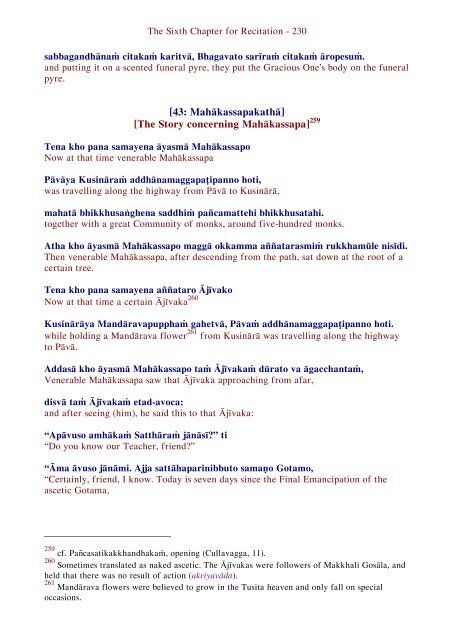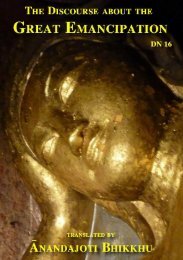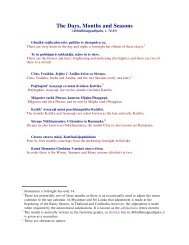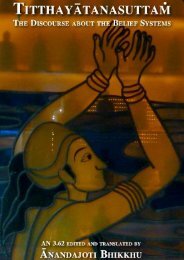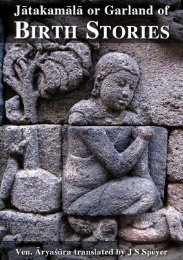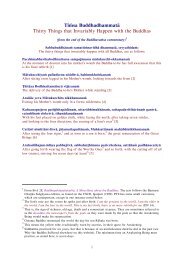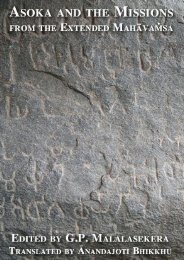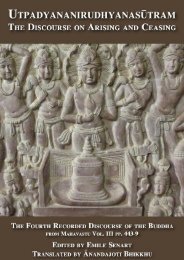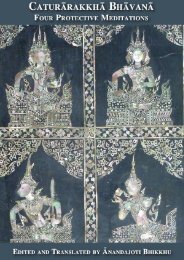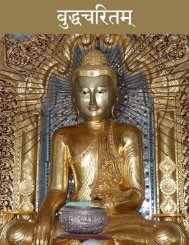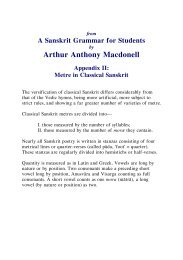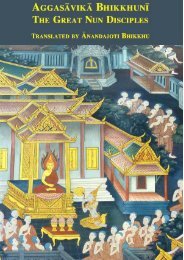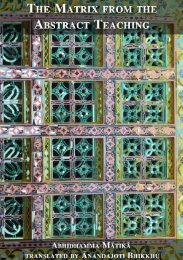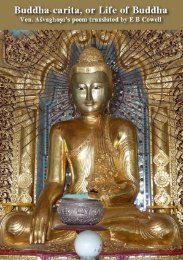- Page 2 and 3:
Mahāparinibbānasuttaṁ (DN 16) T
- Page 4 and 5:
3 [The Fifth Chapter for Recitation
- Page 6 and 7:
5 Preface In preparing this text an
- Page 8 and 9:
Introduction - 7 is to be expected
- Page 10 and 11:
Introduction - 9 However, the Comme
- Page 12 and 13:
Introduction - 11 Because these hav
- Page 14 and 15:
13 Mahāparinibbānasuttaṁ (DN 16
- Page 16 and 17:
The First Chapter for Recitation -
- Page 18 and 19:
The First Chapter for Recitation -
- Page 20 and 21:
The First Chapter for Recitation -
- Page 22 and 23:
The First Chapter for Recitation -
- Page 24 and 25:
The First Chapter for Recitation -
- Page 26 and 27:
The First Chapter for Recitation -
- Page 28 and 29:
The First Chapter for Recitation -
- Page 30 and 31:
The First Chapter for Recitation -
- Page 32 and 33:
The First Chapter for Recitation -
- Page 34 and 35:
The First Chapter for Recitation -
- Page 36 and 37:
The First Chapter for Recitation -
- Page 38 and 39:
The First Chapter for Recitation -
- Page 40 and 41:
The First Chapter for Recitation -
- Page 42 and 43:
The First Chapter for Recitation -
- Page 44 and 45:
The First Chapter for Recitation -
- Page 46 and 47:
The First Chapter for Recitation -
- Page 48 and 49:
The First Chapter for Recitation -
- Page 50 and 51:
Katame pañca? What are the five? T
- Page 52 and 53:
The First Chapter for Recitation -
- Page 54 and 55:
The First Chapter for Recitation -
- Page 56 and 57:
The First Chapter for Recitation -
- Page 58 and 59:
The First Chapter for Recitation -
- Page 60 and 61:
59 [Dutiyabhāṇavāraṁ] [The Se
- Page 62 and 63:
The Second Chapter for Recitation -
- Page 64 and 65:
The Second Chapter for Recitation -
- Page 66 and 67:
The Second Chapter for Recitation -
- Page 68 and 69:
The Second Chapter for Recitation -
- Page 70 and 71:
The Second Chapter for Recitation -
- Page 72 and 73:
The Second Chapter for Recitation -
- Page 74 and 75:
The Second Chapter for Recitation -
- Page 76 and 77:
The Second Chapter for Recitation -
- Page 78 and 79:
The Second Chapter for Recitation -
- Page 80 and 81:
The Second Chapter for Recitation -
- Page 82 and 83:
The Second Chapter for Recitation -
- Page 84 and 85:
The Second Chapter for Recitation -
- Page 86 and 87:
The Second Chapter for Recitation -
- Page 88 and 89:
87 [Tatiyabhāṇavāraṁ] 123 [Th
- Page 90 and 91:
The Third Chapter for Recitation -
- Page 92 and 93:
The Third Chapter for Recitation -
- Page 94 and 95:
The Third Chapter for Recitation -
- Page 96 and 97:
The Third Chapter for Recitation -
- Page 98 and 99:
The Third Chapter for Recitation -
- Page 100 and 101:
The Third Chapter for Recitation -
- Page 102 and 103:
The Third Chapter for Recitation -
- Page 104 and 105:
The Third Chapter for Recitation -
- Page 106 and 107:
Aṭṭha kho imā Ānanda parisā.
- Page 108 and 109:
The Third Chapter for Recitation -
- Page 110 and 111:
The Third Chapter for Recitation -
- Page 112 and 113:
The Third Chapter for Recitation -
- Page 114 and 115:
The Third Chapter for Recitation -
- Page 116 and 117:
The Third Chapter for Recitation -
- Page 118 and 119:
Ayaṁ catuttho vimokkho. This is t
- Page 120 and 121:
The Third Chapter for Recitation -
- Page 122 and 123:
The Third Chapter for Recitation -
- Page 124 and 125:
The Third Chapter for Recitation -
- Page 126 and 127:
The Third Chapter for Recitation -
- Page 128 and 129:
The Third Chapter for Recitation -
- Page 130 and 131:
The Third Chapter for Recitation -
- Page 132 and 133:
na Tathāgataṁ yāci: and did not
- Page 134 and 135:
The Third Chapter for Recitation -
- Page 136 and 137:
The Third Chapter for Recitation -
- Page 138 and 139:
The Third Chapter for Recitation -
- Page 140 and 141:
The Third Chapter for Recitation -
- Page 142 and 143:
The Third Chapter for Recitation -
- Page 144 and 145:
The Fourth Chapter for Recitation -
- Page 146 and 147:
The Fourth Chapter for Recitation -
- Page 148 and 149:
The Fourth Chapter for Recitation -
- Page 150 and 151:
The Fourth Chapter for Recitation -
- Page 152 and 153:
The Fourth Chapter for Recitation -
- Page 154 and 155:
The Fourth Chapter for Recitation -
- Page 156 and 157:
The Fourth Chapter for Recitation -
- Page 158 and 159:
The Fourth Chapter for Recitation -
- Page 160 and 161:
The Fourth Chapter for Recitation -
- Page 162 and 163:
The Fourth Chapter for Recitation -
- Page 164 and 165:
“Taṁ kiṁ maññasi Pukkusa,
- Page 166 and 167:
Tvaṁ pana Bhante kva ahosī’ ti
- Page 168 and 169:
The Fourth Chapter for Recitation -
- Page 170 and 171:
The Fourth Chapter for Recitation -
- Page 172 and 173:
The Fourth Chapter for Recitation -
- Page 174 and 175:
The Fourth Chapter for Recitation -
- Page 176 and 177:
175 [Pañcamabhāṇavāraṁ] [The
- Page 178 and 179:
The Fifth Chapter for Recitation -
- Page 180 and 181: The Fifth Chapter for Recitation -
- Page 182 and 183: The Fifth Chapter for Recitation -
- Page 184 and 185: The Fifth Chapter for Recitation -
- Page 186 and 187: The Fifth Chapter for Recitation -
- Page 188 and 189: The Fifth Chapter for Recitation -
- Page 190 and 191: The Fifth Chapter for Recitation -
- Page 192 and 193: The Fifth Chapter for Recitation -
- Page 194 and 195: The Fifth Chapter for Recitation -
- Page 196 and 197: The Fifth Chapter for Recitation -
- Page 198 and 199: The Fifth Chapter for Recitation -
- Page 200 and 201: The Fifth Chapter for Recitation -
- Page 202 and 203: The Fifth Chapter for Recitation -
- Page 204 and 205: The Fifth Chapter for Recitation -
- Page 206 and 207: The Fifth Chapter for Recitation -
- Page 208 and 209: tatiyo pi tattha samaṇo upalabbha
- Page 210 and 211: andhakāre vā telapajjotaṁ dhār
- Page 212 and 213: The Fifth Chapter for Recitation -
- Page 214 and 215: The Sixth Chapter for Recitation -
- Page 216 and 217: Tatiyam-pi kho te bhikkhū tuṇhī
- Page 218 and 219: The Sixth Chapter for Recitation -
- Page 220 and 221: Brahmā Sahampati imaṁ gāthaṁ
- Page 222 and 223: The Sixth Chapter for Recitation -
- Page 224 and 225: The Sixth Chapter for Recitation -
- Page 226 and 227: Atha kho Kosinārakā Mallā Then t
- Page 228 and 229: The Sixth Chapter for Recitation -
- Page 232 and 233: The Sixth Chapter for Recitation -
- Page 234 and 235: The Sixth Chapter for Recitation -
- Page 236 and 237: The Sixth Chapter for Recitation -
- Page 238 and 239: The Sixth Chapter for Recitation -
- Page 240 and 241: Atha kho Veṭhadīpako brāhmaṇo
- Page 242 and 243: te saṅghe gaṇe etad-avoca: he s
- Page 244 and 245: The Sixth Chapter for Recitation -
- Page 246: The Sixth Chapter for Recitation -


